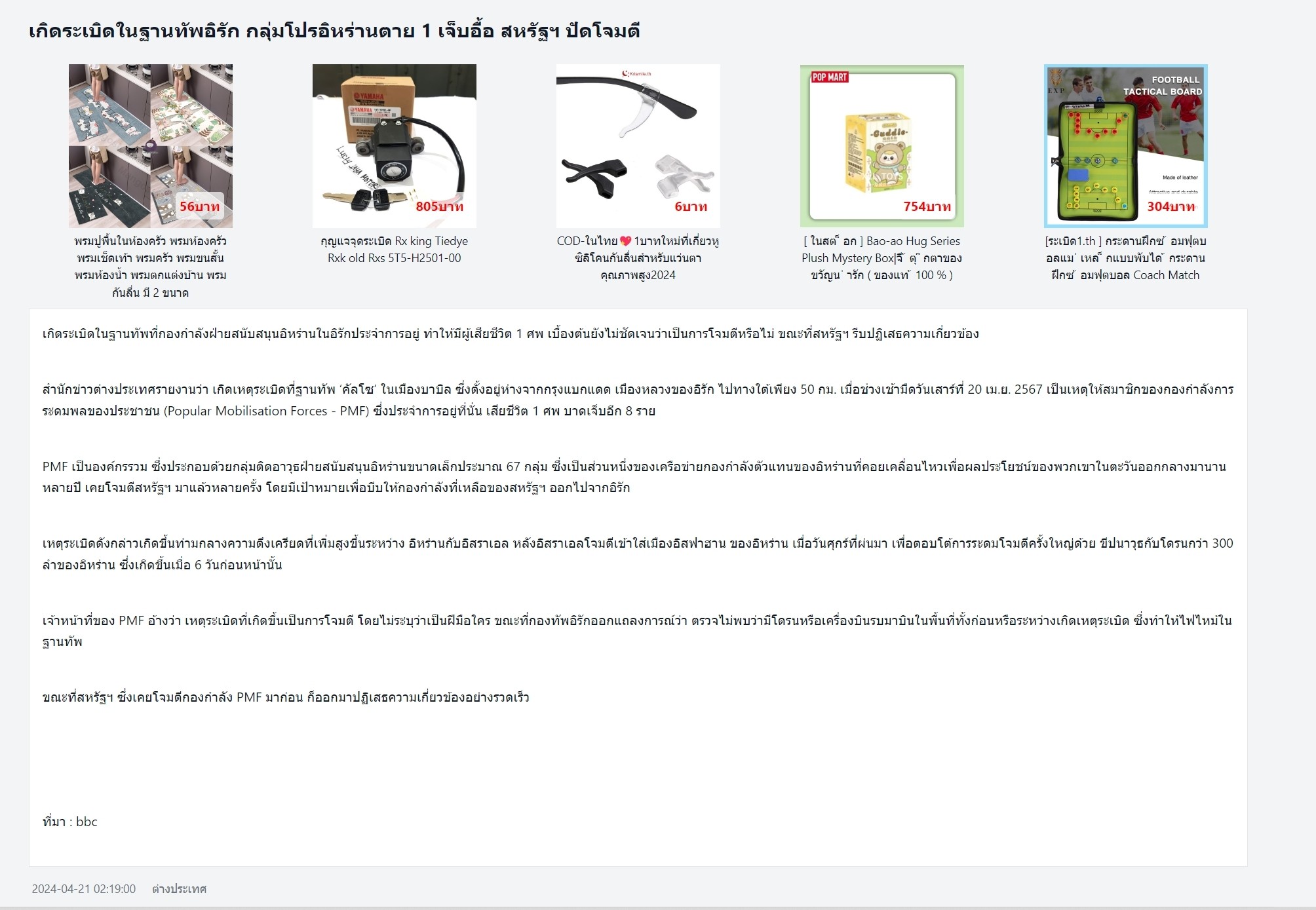ratanon.com - developer
NoSQL บน Object Storage
วันนี้ได้ลองทำการทดสอบเล็กๆ มีคำถามอยู่ว่าถ้ามีสินค้า 1ล้านรายการหรือมากกว่า การเรียกใช้ได้เร็ว การค้ณหาข้อมูลต้องน้อยกว่าวินาที ที่นึกออกคงต้องทำ NoSQL วันนี้ก็เลยลองทำการทดสอบ เกี่ยวกับการทำ NoSQL และการนำไปใช้งาน ซึ่งสามารถนำมาอธิบายได้ดังนี้
1. การสร้างฐานข้อมูล NoSQL บน Object Storage:
- ใช้ Vultr Object Storage เป็นที่เก็บข้อมูล
- แปลงข้อมูลจากไฟล์ CSV เป็น JSON
- แบ่งข้อมูลเป็นไฟล์ย่อยเพื่อการจัดการที่มีประสิทธิภาพ
2. การสร้างดัชนี (Indexing):
- สร้างดัชนีแบบ Inverted Index สำหรับการค้นหาคำสำคัญ
- สร้าง Prefix Trie สำหรับการค้นหาแบบ autocomplete
- สร้างดัชนีตามหมวดหมู่สินค้า
3. การประมวลผลข้อมูล:
- ใช้ multi-threading เพื่อเพิ่มประสิทธิภาพในการประมวลผลไฟล์ขนาดใหญ่
- ทำการ tokenize ข้อความภาษาไทยและอังกฤษ
- ทำความสะอาดข้อมูลและจัดการกับอักขระพิเศษ
4. การจัดเก็บข้อมูลบน Object Storage:
- แยกเก็บข้อมูลสินค้าและดัชนีในโครงสร้างโฟลเดอร์ที่เหมาะสม
- ใช้การเข้ารหัสและการตั้งชื่อไฟล์ที่ปลอดภัย
5. การสร้าง API สำหรับการเข้าถึงข้อมูล:
- พัฒนา Flask API สำหรับการวิเคราะห์เนื้อหาและค้นหาสินค้าที่เกี่ยวข้อง
- ใช้ word tokenization เพื่อแยกคำสำคัญจากข้อความ input
- ค้นหาสินค้าที่เกี่ยวข้องโดยใช้ดัชนีที่สร้างไว้
6. การสร้างลิงก์ Affiliate:
- พัฒนาระบบสร้างลิงก์ Affiliate แบบไดนามิก
- รองรับการสร้างลิงก์ mouseover ที่มีการเข้ารหัสข้อมูล trace
- จัดการกับพารามิเตอร์การติดตามต่างๆ เช่น utm_source, utm_medium
7. การแสดงผลและ UI:
- สร้าง HTML output ที่แสดงสินค้าพร้อมลิงก์ Affiliate
- ใช้ CSS เพื่อจัดรูปแบบการแสดงผลให้น่าสนใจ
- เพิ่ม JavaScript เพื่อจัดการเหตุการณ์ mouseover บนลิงก์สินค้า
8. การปรับแต่งประสิทธิภาพ:
- ใช้ caching เพื่อลดการเรียกข้อมูลซ้ำ
- แบ่งการประมวลผลเป็นชุดเพื่อจัดการกับข้อมูลขนาดใหญ่
- ใช้การทำงานแบบ asynchronous เพื่อเพิ่มประสิทธิภาพ
9. ความปลอดภัยและการจัดการข้อมูล:
- ใช้การเข้ารหัสสำหรับข้อมูลที่ละเอียดอ่อน
- จัดการสิทธิ์การเข้าถึงไฟล์บน Object Storage
10. การนำไปใช้งาน:
- สามารถนำไปใช้ในระบบแนะนำสินค้า (Recommendation System)
- ใช้ในการสร้างระบบ Content Marketing ที่เชื่อมโยงกับสินค้า
- ประยุกต์ใช้ในระบบ Affiliate Marketing
การนำเข้าข้อมูลเพื่อทำ ดัชนี (Indexing)
จัดไปเบาๆ แยก CSV จากสินค้า 1 ล้านรายการ ให้เป็นไฟล์ย่อยก่อน
csv-path.py
import csv
import os
def split_csv(input_file, output_folder, rows_per_file=100000):
if not os.path.exists(output_folder):
os.makedirs(output_folder)
with open(input_file, 'r', newline='', encoding='utf-8') as csvfile:
reader = csv.reader(csvfile)
header = next(reader) # อ่านส่วนหัวของไฟล์
file_number = 1
row_count = 0
current_writer = None
current_file = None
for row in reader:
if row_count % rows_per_file == 0:
if current_file:
current_file.close()
output_file = os.path.join(output_folder, f'products_{file_number:03d}.csv')
current_file = open(output_file, 'w', newline='', encoding='utf-8')
current_writer = csv.writer(current_file)
current_writer.writerow(header) # เขียนส่วนหัวในทุกไฟล์
file_number += 1
current_writer.writerow(row)
row_count += 1
if current_file:
current_file.close()
print(f"แบ่งไฟล์เสร็จสิ้น ได้ทั้งหมด {file_number - 1} ไฟล์")
# ใช้งานฟังก์ชัน
input_file = 'data.csv' # ชื่อไฟล์ CSV ขนาดใหญ่ของคุณ
output_folder = 'split_products' # โฟลเดอร์ที่จะเก็บไฟล์ย่อย
rows_per_file = 1000 # จำนวนแถวต่อไฟล์ย่อย
split_csv(input_file, output_folder, rows_per_file)
แยกแล้วทำการประมวลผลเพื่อนำไปลง Object Storage และทำ ดัชนี (Indexing) จากที่แยกไฟล์ออกได้ 100ไฟล์
shopee-import-nosql.py
import csv
import json
import boto3
from botocore.config import Config
from pythainlp import word_tokenize
import nltk
from nltk.tokenize import word_tokenize as en_word_tokenize
import re
import urllib.parse
from concurrent.futures import ThreadPoolExecutor, as_completed
import os
nltk.download('punkt', quiet=True)
# Vultr API credentials and settings
ACCESS_KEY_ID = ''
SECRET_ACCESS_KEY = ''
BUCKET_NAME = 'nosql'
ENDPOINT_URL = 'https://sgp1.vultrobjects.com'
# Initialize the S3 resource with Vultr credentials
s3 = boto3.resource('s3',
endpoint_url=ENDPOINT_URL,
aws_access_key_id=ACCESS_KEY_ID,
aws_secret_access_key=SECRET_ACCESS_KEY,
config=Config(signature_version='s3v4'),
region_name='sgp1')
# Global dictionaries for caching
category_cache = {}
inverted_index_cache = {}
prefix_trie_cache = {}
def is_thai(text):
return any("\u0E00" <= c <= "\u0E7F" for c in text)
def tokenize_text(text):
if is_thai(text):
return [word for word in word_tokenize(text, engine='newmm') if len(word) <= 20]
else:
return [word for word in en_word_tokenize(text) if len(word) <= 20]
def clean_filename(filename):
filename = urllib.parse.unquote(filename)
filename = re.sub(r'[^\w\-ก-๙\._ ]', '_', filename) # อนุญาตอักษรภาษาไทย
filename = re.sub(r'_+', '_', filename)
return filename.strip('_')
def update_index(index_type, key1, key2=None, key3=None, itemid=None):
if index_type == 'categories':
if key1 not in category_cache:
category_cache[key1] = {}
if key2 not in category_cache[key1]:
category_cache[key1][key2] = {}
if key3 not in category_cache[key1][key2]:
category_cache[key1][key2][key3] = set()
category_cache[key1][key2][key3].add(itemid)
elif index_type == 'inverted_index':
if key1 not in inverted_index_cache:
inverted_index_cache[key1] = set()
inverted_index_cache[key1].add(itemid)
elif index_type == 'prefix_trie':
if key1 not in prefix_trie_cache:
prefix_trie_cache[key1] = set()
prefix_trie_cache[key1].add(itemid)
def process_csv_chunk(chunk):
for row in chunk:
try:
item_filename = f'shopee/items/item_{row["itemid"]}.json'
s3.Object(BUCKET_NAME, item_filename).put(
Body=json.dumps(row, ensure_ascii=False),
ACL='public-read',
ContentType='application/json'
)
update_index('categories', row['global_category1'], row['global_category2'], row['global_category3'], row['itemid'])
words = tokenize_text(row['title'])
for word in words[:3]:
clean_word = clean_filename(word)
update_index('prefix_trie', clean_word, itemid=row['itemid'])
update_index('inverted_index', clean_word, itemid=row['itemid'])
except Exception as e:
print(f"Error processing row {row.get('itemid', 'unknown')}: {str(e)}")
def process_csv_file(csv_file_path):
chunk_size = 1000
with open(csv_file_path, 'r', encoding='utf-8') as csvfile:
csvreader = csv.DictReader(csvfile)
chunks = []
current_chunk = []
for i, row in enumerate(csvreader):
current_chunk.append(row)
if len(current_chunk) == chunk_size:
chunks.append(current_chunk)
current_chunk = []
if i % 1000 == 0:
print(f"Read {i} rows from {csv_file_path}")
if current_chunk:
chunks.append(current_chunk)
with ThreadPoolExecutor(max_workers=10) as executor:
futures = [executor.submit(process_csv_chunk, chunk) for chunk in chunks]
for future in as_completed(futures):
try:
future.result()
except Exception as e:
print(f"Error in thread: {str(e)}")
# Upload indexes after processing each file
upload_cached_indexes()
print(f"Uploaded indexes for {csv_file_path}")
def upload_cached_indexes():
for key, value in category_cache.items():
filename = f'shopee/indexes/categories_{clean_filename(key)}.json'
s3.Object(BUCKET_NAME, filename).put(
Body=json.dumps({k: {kk: list(vv) for kk, vv in v.items()} for k, v in value.items()}, ensure_ascii=False),
ACL='public-read',
ContentType='application/json'
)
for key, value in inverted_index_cache.items():
filename = f'shopee/indexes/inverted_index_{clean_filename(key)}.json'
s3.Object(BUCKET_NAME, filename).put(
Body=json.dumps(list(value), ensure_ascii=False),
ACL='public-read',
ContentType='application/json'
)
for key, value in prefix_trie_cache.items():
filename = f'shopee/indexes/prefix_trie_{clean_filename(key)}.json'
s3.Object(BUCKET_NAME, filename).put(
Body=json.dumps(list(value), ensure_ascii=False),
ACL='public-read',
ContentType='application/json'
)
def ensure_folders_exist():
folders = ['shopee/indexes', 'shopee/items']
for folder in folders:
s3.Object(BUCKET_NAME, f"{folder}/").put(Body='')
if __name__ == "__main__":
try:
ensure_folders_exist()
# สร้างรายการไฟล์ CSV ตั้งแต่ 001 ถึง 1000
csv_files = [f'products_{i:03d}.csv' for i in range(10, 1001)]
for csv_file in csv_files:
csv_file_path = os.path.join('split_products', csv_file)
if os.path.exists(csv_file_path):
print(f"Processing {csv_file}")
process_csv_file(csv_file_path)
else:
print(f"File {csv_file} not found. Skipping.")
print("Final upload of cached indexes")
upload_cached_indexes()
print("Process completed successfully.")
except Exception as e:
print(f"An error occurred: {str(e)}")
Code API เพื่อนำข้อมูลจาก NoSQL มาใช้งาน
shopee.py
from flask import Blueprint, request, jsonify
from pythainlp import word_tokenize
import boto3
from botocore.config import Config
import json
import re
import random
import urllib.parse
import base64
import uuid
shopee = Blueprint('shopee', __name__)
# Vultr API credentials and settings
ACCESS_KEY_ID = ''
SECRET_ACCESS_KEY = ''
BUCKET_NAME = 'nosql'
ENDPOINT_URL = 'https://sgp1.vultrobjects.com'
# Initialize the S3 client with Vultr credentials
s3 = boto3.client('s3',
endpoint_url=ENDPOINT_URL,
aws_access_key_id=ACCESS_KEY_ID,
aws_secret_access_key=SECRET_ACCESS_KEY,
config=Config(signature_version='s3v4'),
region_name='sgp1')
def clean_filename(filename):
filename = re.sub(r'[^\w\-ก-๙\._ ]', '_', filename)
filename = re.sub(r'_+', '_', filename)
return filename.strip('_')
def get_index_data(index_type, key):
try:
filename = f'shopee/indexes/{index_type}_{clean_filename(key)}.json'
response = s3.get_object(Bucket=BUCKET_NAME, Key=filename)
return json.loads(response['Body'].read().decode('utf-8'))
except Exception as e:
print(f"Error getting index data: {str(e)}")
return {}
def get_item_data(itemid):
try:
filename = f'shopee/items/item_{itemid}.json'
response = s3.get_object(Bucket=BUCKET_NAME, Key=filename)
return json.loads(response['Body'].read().decode('utf-8'))
except Exception as e:
print(f"Error getting item data: {str(e)}")
return None
def create_affiliate_link(product_link, affiliate_id):
parsed_url = urllib.parse.urlparse(product_link)
query_params = urllib.parse.parse_qs(parsed_url.query)
# Generate dynamic tracking IDs
uls_trackid = f"507{uuid.uuid4().hex[:8]}0109"
utm_term = f"bf1{uuid.uuid4().hex[:10]}"
# Create trace data
trace_data = {
"trace_id": f"0.{uuid.uuid4().hex[:12]}.104",
"pre_trace_id": f"0.{uuid.uuid4().hex[:12]}.600",
"list_type": 104,
"root_trace_id": f"0.{uuid.uuid4().hex[:12]}.600",
"root_list_type": 600,
"depth": 1
}
encoded_trace = base64.urlsafe_b64encode(json.dumps(trace_data).encode()).decode()
# Extract product ID from the URL
product_id = parsed_url.path.split('/')[-1]
# Create affiliate link
affiliate_params = {
'uls_trackid': uls_trackid,
'utm_campaign': '-',
'utm_content': '----',
'utm_medium': 'affiliates',
'utm_source': f'an_{affiliate_id}',
'utm_term': utm_term
}
affiliate_url = f"https://shopee.co.th/product/{parsed_url.path.split('/')[-2]}/{product_id}?{urllib.parse.urlencode(affiliate_params)}"
# Create mouseover link
mouseover_link = f"https://affiliate.shopee.co.th/offer/product_offer/{product_id}?trace={encoded_trace}"
return affiliate_url, mouseover_link
@shopee.route('/analyze', methods=['POST', 'GET'])
def analyze_content():
if request.method == 'POST':
data = request.get_json()
content = data.get('content', '')
words = word_tokenize(content)
related_item_ids = set()
for word in words[:3]:
clean_word = clean_filename(word)
index_data = get_index_data('inverted_index', clean_word)
related_item_ids.update(index_data)
selected_item_ids = random.sample(list(related_item_ids), min(5, len(related_item_ids)))
css = '''
<style>
.shopee-container {
display: flex;
flex-wrap: wrap;
justify-content: space-around;
}
.shopee-item {
width: 200px;
margin: 10px;
text-align: center;
}
.image-container {
position: relative;
width: 100%;
}
.shopee-item img {
max-width: 100%;
height: auto;
}
.shopee-price {
position: absolute;
bottom: 10px;
right: 10px;
background-color: rgba(255, 255, 255, 0.7);
padding: 5px;
border-radius: 5px;
font-weight: bold;
color: red;
}
.shopee-title {
margin-top: 5px;
font-size: 14px;
}
</style>
'''
html_output = css + '<div class="shopee-container">'
for itemid in selected_item_ids:
item_data = get_item_data(itemid)
if item_data:
price = item_data.get('price', 'N/A')
affiliate_id = "15344040055" # แทนที่ด้วย Affiliate ID ของคุณ
product_link = item_data['product_link']
affiliate_link, mouseover_link = create_affiliate_link(product_link, affiliate_id)
html_output += f'''
<div class="shopee-item">
<a href="{affiliate_link}" target="_blank" data-mouseover="{mouseover_link}">
<div class="image-container">
<img src="{item_data['image_link']}" alt="{item_data['title']}">
<div class="shopee-price">{price}บาท</div>
</div>
<p class="shopee-title">{item_data['title']}</p>
</a>
</div>
'''
html_output += '</div>'
# Add JavaScript to handle mouseover event
html_output += '''
<script>
document.querySelectorAll('.shopee-item a').forEach(link => {
link.addEventListener('mouseover', function() {
this.setAttribute('href', this.getAttribute('data-mouseover'));
});
link.addEventListener('mouseout', function() {
this.setAttribute('href', this.getAttribute('data-original-link'));
});
link.setAttribute('data-original-link', link.getAttribute('href'));
});
</script>
'''
return jsonify(html=html_output)
else:
return "Shopee analyze running"
def create_app():
from flask import Flask
app = Flask(__name__)
app.register_blueprint(shopee, url_prefix='/shopee')
return app
if __name__ == '__main__':
app = create_app()
app.run(host='0.0.0.0', port=5001)
Code เรียกใช้งาน API
.js สำหรับนำไปแปะ เพื่อนำ <h1 ยิงไป api เพื่อวิเคราะข้อมูลและส่งกลับมาว่าจะแสดงสินค้าอะไร
<script>
async function fetchShopeeItems() {
const heading = document.querySelector('h1').innerText;
try {
const response = await fetch('https://api.m1n.app:8443/shopee/analyze', {
method: 'POST',
headers: { 'Content-Type': 'application/json' },
body: JSON.stringify({ content: heading })
});
if (response.ok) {
const result = await response.json();
document.getElementById('shopee-container').innerHTML = result.html;
} else {
console.error('Error fetching Shopee items:', response.statusText);
}
} catch (error) {
console.error('Error:', error);
}
}
document.addEventListener('DOMContentLoaded', fetchShopeeItems);
</script>
ส่วนของการแสดงโฆษณา
<div id="shopee-container"></div>

